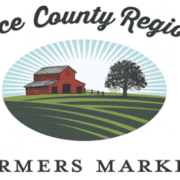Chamber’s ‘State Of Agriculture’ Remembers History, Speaks To Future Of Farming
If you’ve ever had a garden, you know the feeling of excitement and expectation associated with planting seeds or slips and waiting for the reward of harvesting a vine-ripened tomato, crooked neck squash or, heck, even that umpteenth zucchini that you pawn off on unsuspecting neighbors or “city folk.”
It’s the same with farmers, but there’s a lot more at stake. For those men and women whose livelihood is farming and agriculture, the excitement and expectation is there every planting season, but all it takes is one ill-timed storm or prolonged drought to reduce a bountiful harvest to a washout.
At Wednesday’s ‘State of Agriculture’ luncheon hosted by the Henderson-Vance Chamber of Commerce, about 100 individuals gathered at the Vance County Regional Farmers Market to champion agriculture, its importance to the area and how the community can support those local producers.
Dr. Wykia Macon, director of the Vance County Cooperative Extension, told the group that agriculture is “undeniably central to our lives,” adding that cooperative extension programs support agriculture in all its forms – from livestock and horticulture to youth programs like 4-H.
Vance County is a microcosm for the larger landscape of agriculture, she said. The loss of farms and farmland, as well as a smaller labor pool and having more farmer approaching retirement age all are factors that shape agriculture today.
She advocates an “intergenerational transfer of knowledge” and said veteran farmers have a wealth of knowledge to share with the younger generation.
But the younger farmers have something to offer, too. They are using technology tools from advanced irrigation equipment to drones to make farming more economical and sustainable. High tunnels extend the growing season, which helps producers get local produce to markets sooner.
Making farming more economical and sustainable grows more important by the day, it seems.
Macon said finding ways to embrace technology, being comfortable with trying new things and going into farming with a business mindset all serve today’s producers well.
The word “sustainable” is a trendy buzz word used in agriculture to describe farming practices that are ecologically sound.
But Jay Boyette, manager of Regulatory and State Government Relations with Farm Bureau, said sustainable applies to the business practices related to farming and agriculture.
“Farming is a lifestyle, but it’s also a business,” Boyette told the group, adding that the financial side of farming sometimes is an afterthought.
There are 238 farms in Vance County, which means that’s 238 businesses that are doing business in one form or another.
The tobacco or soybean farmer has a market for what he produces, but the small farmer also has a market, whether it’s a spot at the local farmers market or a farmstand on his or her own property.
“The Number 1 challenge is farm profitability,” Boyette said. It’s a real challenge to make a profit, and it’s not uncommon for a farmer to have a “day job” that bankrolls his agricultural endeavors.
The second challenge is farmland preservation,“We’re losing farmland at a very high rate in our state,” he said.
So what’s a farmer to do?
Boyette has one word: Agritourism.
It’s both a blessing and a curse to be in close proximity to more urban areas like Raleigh and Durham. Farmers, in their search to add value to what they already do, are turning to agritourism.
More and more, people are looking for opportunities to experience agriculture, whether it’s to pick strawberries in the spring or get up close with farm animals and check out the daily chores associated with farm life.
Local farmer Thomas Shaw summed it up in a word: Change.
Used to be, most farmers had a cow for milk, chickens for eggs and the occasional Sunday dinner, and a few hogs in the hog pen.
“You look around, all that’s gone,” Shaw told the group. “That was the backbone of Vance County.”
Change may be inevitable, and farmers, like everybody else, make adjustments to the way they do business. That’s how agriculture remains relevant.

